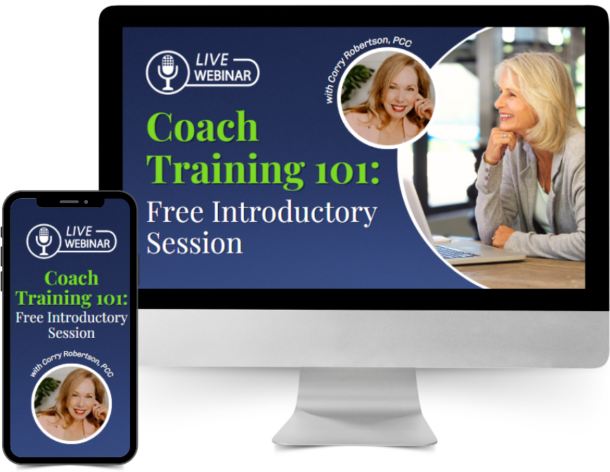Have you ever heard your organization mention “coaching” and “mentoring” and wondered—are they really different?
Lately, there’s been a growing buzz around these two approaches, and for good reason. In fact, many articles in the popular press and academic journals cite evidence that mentoring and coaching play “a major role in people’s career development” — particularly in improving skills, performance, and development.
But while both coaching and mentoring are powerful tools for professional growth, they each serve different purposes and offer unique benefits.
Understanding these differences can help you make more informed choices about the kind of support you need, whether you’re an executive coach, a leader, or an organization looking to develop its people.
And that’s exactly what we’re going to uncover in this blog.
It’s important to recognize the differences between coaching vs. mentoring because they determine how you, or those you lead, can best be supported. Whether you’re guiding your team or seeking development yourself, knowing when to lean on coaching or mentoring helps tailor the approach for the best possible outcome. So let’s start!

Understanding Coaching and Mentoring
What is Coaching?
If you’ve been an avid reader of my blogs, you’ve likely come across the concept of coaching before. But let’s take a moment to refresh and dive deeper into what coaching truly entails.
According to the International Coaching Federation (ICF), coaching is defined as “partnering with clients in a thought-provoking and creative process that inspires them to maximize their personal and professional potential.”
This partnership is at the core of what makes coaching so distinct—it’s not about guiding or offering solutions but rather supporting and empowering individuals to find their own answers.
Coaching is future-focused and outcome-oriented, structured, with the intention of personal change, self-awareness, or performance improvement. Unlike other forms of development, such as mentoring or consulting, coaching doesn’t involve giving advice or strategies. Instead, the coach acts as a strategic thinking partner, providing a safe space for clients to reflect, explore possibilities, and make decisions that align with their personal and professional ambitions. It’s a process that encourages self-awareness and accountability, helping clients take ownership of their growth.
Coaching can take place in a variety of contexts. In business, coaching might focus on improving leadership skills or navigating career transitions. Many individuals work on well-being, personal growth, relationships, or work-life balance. Executive coaching is often centered around topics like those and more, such as enhancing leadership capabilities, decision-making, and overall performance at a higher level within an organization.
Regardless of the topic, the coach’s role remains the same—supporting the client’s journey by being curious, asking the right questions, sparking insights, and fostering a mindset of continuous personal growth and development as a human being.

What is Mentoring?
On the other hand, mentoring is a distinct form of support that is also relationship-driven and often takes place over the long term. While coaching focuses on unlocking an individual’s potential through a thought-provoking partnership, mentoring involves a more experienced individual—often someone within the same field—sharing their knowledge, expertise, and insights to help guide the mentee’s personal and professional development. The expectation is that the mentor’s experience, influence, and wisdom will provide valuable direction as the mentee navigates their career path.
Mentoring can be informal, but similar to coaching, there is a focus on building a strong, trusting relationship. This support is less structured than coaching and often centers around the mentor’s personal experiences and advice. The relationship is driven by the needs of the mentee, who looks to the mentor as a source of knowledge, guidance, and sometimes inspiration. Through this relationship, mentees gain insight into their mentor’s experiences, learning valuable lessons that can help them overcome challenges and make informed decisions about their own career and personal growth.
Mentoring can occur in various contexts. It’s often seen in career guidance, where a senior professional helps a junior colleague navigate their career path or develop new skills. Mentors may also assist with skill development, helping their mentees enhance their expertise in areas like leadership, communication, or technical abilities. Unlike a manager, the mentor’s role is not about directing work. Instead, they offer support, share lessons from their own journey, and help the mentee take meaningful steps toward their goals.

Key Differences Between Coaching vs. Mentoring
Now that we have a clear definition of what the role of coaching versus mentoring entails, let’s take a closer look at how they differ based on two important factors.
Focus and Objectives
When it comes to focus and objectives, coaching and mentoring both aim to support personal and professional growth, but they do so in very different ways. In professional coaching sessions, the focus is not on correcting behaviours or pointing out what’s being done poorly. Instead, the client focuses on identifying development opportunities, building on their strengths and capabilities. The goal is to help the client tap into their potential and discover new ways to tackle a challenge or achieve their goals, rather than being told what they need to fix.
Coaching can also help improve interpersonal skills such as communication and confidence during professional interactions.
In contrast, mentors share their knowledge and experiences to guide mentees in navigating their career paths, and often include skill enhancement, onboarding support, and education. This guidance is typically rooted in the mentor’s expertise and insights, focusing on the mentee’s overall development rather than specific performance outcomes. While a mentor may advise on career moves or skill development, coaching is about the client exploring their own thoughts, beliefs, and aspirations to uncover new approaches or solutions.
Unlike mentoring, which often involves sharing advice and personal experiences, coaching does not involve the coach sharing their story, or offering suggestions or solutions. Coaches act as thinking partners, guiding individuals to explore their unique paths. Through powerful questioning and reflection, coaches aim to evoke awareness in their clients so that they find the answers that resonate with them, fostering a sense of ownership over their growth.
Another key difference is that coaching doesn’t require the coach to have experience in the client’s specific field or industry. A coach’s value lies in their coaching skills and professional training, not their expertise in a particular area. That’s why coaches are such valuable allies—they aren’t there to tell you what’s wrong or how to fix it. Instead, they take you through a future-focused, results-oriented thinking process.
There’s a common misconception that coaching is the same as consulting, advising, or mentoring and that coaches need to be where their clients want to go. But this is simply not true. It’s like thinking that only a doctor who has given birth can help deliver a baby or that only a divorced person can be a divorce lawyer. Coaches don’t need to have lived through the exact experiences of their clients to help them—what they offer is a specialized skill set that allows clients to find the right solutions for themselves.

Structure and Duration
Coaching and mentoring also differ significantly in their approach and timeframes. Coaching typically follows a more structured process, often involving scheduled sessions and specific methodologies. This framework allows coaches and clients to track growth and progress over time, ensuring that each session is purposeful and aligned with the desired outcomes. The structured nature of coaching often involves the client setting their own timelines for achieving specific objectives, which can help create accountability and drive focused conversations.
In contrast, mentoring tends to have a more flexible structure. While they can follow a specific meeting schedule, mentoring relationships can also evolve organically, with the mentor providing insights and guidance as needed rather than adhering to a fixed plan.
Regarding duration, coaching relationships can be as short as 3 to 6 months or can last many years. Short-term coaching may focus on achieving specific goals within a set timeframe, and long-term coaching tends to take place with clients on a lifelong quest for self-discovery and personal growth within a well-founded, trusting relationship.
Mentoring can take the same approach regarding duration, with shorter mentoring mandates to encourage rapid progress and tangible results or a long-term approach for those who invest in their well-being.

Where Mentoring and Coaching Apply
Mentoring and coaching can be incredibly helpful in various situations, whether you’re looking to grow personally, advance your career, or develop your leadership skills. Let’s explore some scenarios where each approach really shines:
Mentoring Scenarios
- New Employee Onboarding: Stepping into a new job can be overwhelming. That’s where mentoring plays a key role. An experienced mentor can help guide you through your new responsibilities and assist you in adjusting to the company culture. Their support can make the transition smoother and more manageable.
- Career Skills: Mentoring is also a fantastic means to learn how to perform specific career skills. Mentors bring their insights and experiences to the table, helping you make informed choices as you learn.
Coaching Scenarios
- Performance Improvement: If you’re looking to boost your performance, coaching is the way to go. Coaches provide structured support and hold you accountable as you set specific goals. It’s all about unlocking your potential and helping you reach new heights.
- Career Transition: In a similar way, when changing careers feels daunting, a coach can help ease that transition. They’re there to support you in navigating the twists and turns, explore new opportunities and you as you make those important decisions. Think of them as your personal ally as you navigate your transition.
- Self-Discovery and Personal Growth: While mentoring focuses on transmitting knowledge and skills from mentor to mentee, coaching prioritizes self-discovery and personal growth. Coaching encourages individuals to explore their own potential and challenges through introspection and self-awareness. This transformative process helps uncover deep-seated beliefs and motivations, empowering individuals to take control of their growth and chart their own paths forward. Unlike mentoring, where the guidance is often prescriptive, coaching fosters a journey of personal exploration that leads to self-driven and authentic development.

Shared Scenarios
- Leadership Development: Both mentoring and coaching play a huge role in developing strong leaders. Mentors share their experiences and wisdom, offering valuable insights, while coaches allow leaders to deepen their understanding of their leadership style. Coaching also supports leaders on their development journey by helping them identify their strengths, areas for improvement, overcome obstacles, and unleash their full potential as leaders. Together, coaching and mentoring create a powerful support system for future leaders by helping sharpen their skills and resilience.
- Team Development: Coaching and mentoring are key to creating strong teams. Both coaching and mentoring focus on leadership development and performance improvement, as well as specific skills and work cultures. Together, they create an environment where collaboration thrives, and every team member feels valued and heard. This supportive atmosphere is ultimately what encourages creativity and problem-solving.
Why Understanding the Difference Matters
Coaching and mentoring are often misunderstood, which can make it challenging for coaches to define their roles. Many coaches struggle with expectations from clients who might think they need guidance in the same way a mentor would provide. And that confusion is what leads to frustration on both sides. When coaches are clear about their purpose as strategic thinking partners, they can better serve their clients and help them discover their own paths.
It’s also equally important for clients to know the difference between coaching and mentoring, as it allows them to choose the right kind of support based on their specific needs. Some individuals may benefit from the awareness-evoking approach of coaching, focusing on achieving better outcomes, while others may find value in the personal advice offered by a mentoring relationship. When clients understand these distinctions, they can seek the right partnership to support their growth effectively, ensuring they receive the guidance that best fits their journey.

Final Takeaway
Being aware of the distinction between coaching and mentoring is crucial for enhancing your skills and effectiveness, especially given the rising interest in both approaches. Each serves unique purposes and offers different benefits, shaping how individuals and organizations can thrive.
For leaders who want to explore the benefits of the executive coaching process, I invite you to learn more here. For companies who want to understand how to build a coaching culture within their organization, you can connect with me here.
And for those interested in becoming a professional coach, you can learn more about our ICF Certified Leadership coaching training programs here.





0 Comments